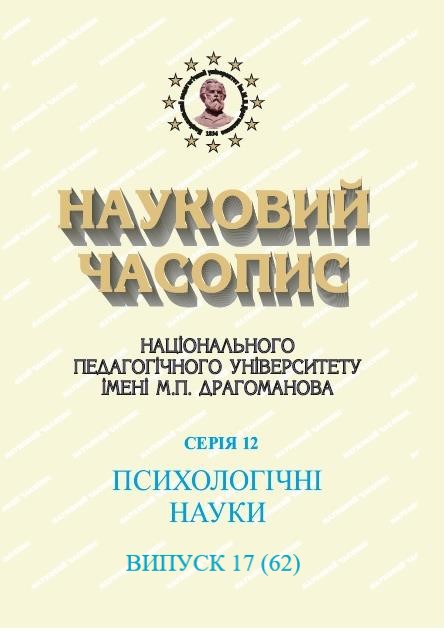PSYCHOLOGICAL ASPECTS OF THE INFLUENCE OF ART THERAPY ON POSITIVE CHANGES IN WOMEN’S SELF-ASSEMBLY
DOI:
https://doi.org/10.31392/NPU-nc.series12.2022.17(62).07Keywords:
self-attitude, self-acceptance, self-assessment, self-management, isolation, self-regulation, self-image, art therapy, creative self-expression.Abstract
The article reveals the essence of self-assessment and the modern view of scientists on this phenomenon. Attention is paid to the study of theoretical and methodological problems of the phenomenon of self-attitude, its psychological categories and one of the effective ways to correct self-esteem ─ the use of art-therapeutic methods. Combining different types of art therapy allows you to mobilize the creative potential of the individual and find the most effective ways of self-expression, which fully provide opportunities to express their feelings and thoughts. The aim of the study was to identify changes in self-esteem in women in the group of long-term art therapy. Empirical methods were used for the study, such as “Methodology of self-relation research” by SR Panteleev and Test of twenty statements “Who am I? ” M. Kuhn, T. McPartland in modification, as well as a post-research interview aimed at identifying the features of self-assessment. The results were processed using Student’s T-test. The article stipulates that in group art therapy, due to the presence of a group member in an atmosphere of acceptance and invaluability, the form of attitude to oneself may change. Support and acceptance of the participant increases his self-acceptance and reduces self-blame, which will positively affect the overall level of self-esteem. Conclusions. It was found that long-term attendance in art groups reduces the overall negative background of self-esteem, assessment of opportunities and qualities of personality becomes more adequate, high level of self-interest and value of their personality is maintained, participants are mostly focused on their feelings, experiences and uniqueness. An effective solution to the problem of self-esteem in women, especially now that Ukraine is at war, when many women find themselves in a situation that negatively affects their self-esteem, and subsequently in relationships with others, will change the dynamics of self-esteem on a positive background -therapy. Based on research data, it is possible to create programs to find personal resources in any frustrating situation.
References
- Berns, R. (1986). Razvitie Ja-koncepcii i vospitanie [Self-concept development and upbringing]. Moscow : Progress [in Russian].
- Voznesenskaya, E.L. (2005). Art-terapevticheskie tekhnologii v formirovanii zrelykh muzhskikh i zhenskikh fenomenov “Ya” v prostranstve vnutrennej skazki [Art-therapeutic technologies in the formation of mature male and female phenomena “I” in the space of an inner fairy tale]. Prostir art-terapiyi: mozhlivosti ta perspektivi: Zbirnik naukovikh statej – Space of art therapy: opportunities and prospects: Collection of scientific articles, 33–44. Retrieved from https://www.b17.ru/article/art-therapevticheskie_technologii/ [in Ukrainian].
- Kidalova, K.S. (2018). Psykholohichni osoblyvosti samostavlennia osobystosti: analiz kontseptsii ta pidkhodiv [Psychological features of self-esteem: analysis of concepts and approaches]. Ukrainskyi psykholohichnyi zhurnal – Ukrainian Psychological Journal, 2(8), 48–58 [in Ukrainian].
- Kolodiazhna, A.V. (2016). Poiednannia komponentiv samostavlennia osobystosti vidpovidno do yii tvorchykh proiaviv [The combination of components of self-attitude of the individual in accordance with its creative manifestations]. Scientific Journal, 5, 93–96 [in Ukrainian].
- Starovojtov, A.V.(2015). Rubezhi sovremennoj art–terapii: ot teorii k praktike [Frontiers of modern art therapy: from theory to practice]. Gumanitarnye nauki – Humanitarian sciences, 4, 95–100 [in Russian].
- Tyshchenko, L. (2012). Fenomenolohiia samostavlennia v psykholohichnii nautsi [Phenomenology of self-assessment in psychological science]. Naukovyi visnyk Mykolaivskoho derzhavnoho universytetu imeni V. O. Sukhomlynskoho – Scientific Bulletin of the Nikolaev State University named after V. Sukhomlinsky, 2,(9), 230–233 [in Ukrainian].
- Chesnokova, I.I. (1977). Problemy samosoznanija v psihologii [Problems of self-consciousness in psychology]. Moscow : Nauka [in Russian].
- Iavorska-Vietrova, I.V. (2017). Teoretychnyi analiz problemy samostavlennia: tsinnisnyi aspekt [Theoretical analysis of the problem of self-assessment: the value aspect.]. Aktualni problemy psykholohii. Psykholohiia obdarovanosti. Zbirnyk naukovykh prats Instytutu psykholohii imeni H.S. Kostiuka NAPN Ukrainy – Current issues of psychology. Psychology of giftedness. Collection of scientific works of the GS Institute of Psychology Kostyuk NAPS of Ukraine, 6(13), 198–206 [in Ukrainian].
- Arnold, R. (2020) Navigating Loss Through Creativity: Influences of Bereavement on Creativity and Professional Practice in Art Therapy. Art Therapy, 37(1), 6–15, https://doi.org/10.1080/07421656.2019.1657718
- Erol, R. Y., & Orth, U. (2016). Self-esteem and the quality of romantic relationships. European Psychologist, 21(4), 274–283. https://doi.org/10.1027/1016-9040/a000259
- Hattie, J. (1996). Effects of learning skills interventions on student learning: A metaanalysis. Review of Educational Research, 99–136. https://doi.org/10.3102/00346543066002099.
- Jabbar, S. and Betawi, A. (2019) Children Express: Themes of War and Peace in the Drawings of Iraqi Refugee Children in Jordan. International Journal of Adolescents and Youth, 24(1), 1–18, https://doi.org/10.1080/02673843.2018.1455058
- Neff, K.D., & Vonk, R.(2009) Self-compassion versus global self-esteem: two different ways of relating to oneself. Journal of Personality, 77(1), 23–50. https://doi.org/10.1111/j.1467-6494.2008.00537.x
- Oyserman, D. Self-concept and identity In: Tesser A, Schwarz N, editors. The Blackwell Handbook of Social Psychology. Malden, MA: Blackwell; 2001, 499–517. https://deepblue.lib.umich.edu/bitstream/handle/2027.42/89946/oyserman__2001.pdf?seq
- Salom, A. (2013) Art therapy and its contemplative nature: unifying aspects of imaging, art therapyю 30(4), 142–50. https://doi.org/10.1080/07421656.2014.846203 .
- Spiegel, D., Malchiodi, C., Bakos, A., & Colley, K. (2006). Art Therapy for Combat-Related Post Traumatic Stress Disorder: Recommendations for Research and Practice. Art Therapy, 23(4), 157–164. https://doi.org/10.1080/07421656.2006.10129335 .
- What is Art Therapy? [Электронный ресурс]. Retrieved from http://www.baat.org/About-ArtTherapy

